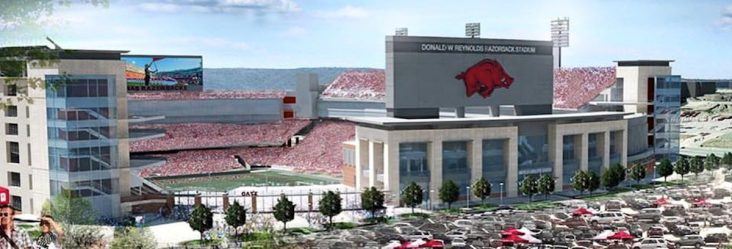UA System Trustees approve $160 million football stadium expansion despite growing objections
by June 16, 2016 3:04 pm 1,737 views

Rendering of the planned expansion of the north end of Donald W. Reynolds Razorback Stadium in Fayetteville.
The University of Arkansas System Board of Trustees has approved what has become a controversial $160 million expansion of Donald W. Reynolds Razorback Stadium in Fayetteville. Trustee and former U.S. Sen. David Pryor, along with five former UA Trustees, had lobbied for the plan to be rejected.
In an 8-2 vote, with Pryor and Cliff Gibson opposing, the Trustees gave UA Athletic Director Jeff Long the green light to proceed with a $120 million bond sale to support the project. An estimated $40 million in donations will fund the remainder of the project. The last major stadium renovation was approved in 2001.
The renovation will include additions in the north end zone that would connect the east and west sides. About 3,200 premium seats would be added, as would a new game day locker room, training room, and pre/post game support rooms for the football team. New elevators would be installed at the northeast and northwest corners. Existing suites and club areas will be renovated and updated. A new video board would be added at the south end of the stadium.
The Frank Broyles Athletic Center administration area, designed when the UA had separate men’s and women’s athletic departments, would be rebuilt in the new north end. Leading to the stadium would be a new “Hog Walk” where the players would walk to the game as fans cheer them on – a process that now happens through the parking lot. Long said the addition would make it easier to get fans out of the stadium in a security situation.
UA officials have said the project will be funded entirely by athletic revenues, gifts and bond proceeds from a future bond issue. Bonds will be amortized using athletic revenues generated from the stadium. No university funds, state funds or student fees will be required to complete this project.
“We are pleased to be moving forward with this important project that will improve the game day experience for all Razorback fans visiting Donald W. Reynolds Razorback Stadium,” Vice Chancellor and Director of Athletics Jeff Long said in a statement after the vote. “We appreciate the due diligence shown by the Board of Trustees in this process and are appreciative of their support. Every fan that attends a game will benefit from the enhancements throughout the stadium, including renovations to existing areas, the addition of public elevators and a north concourse to allow fans to move more freely within the stadium and a south video board.”
‘TERRIBLE TIME’ FOR THE EXPANSION
In written remarks to the Trustees prior to Thursday’s meeting, Pryor, who also served as Arkansas’ Governor, said the expansion plan “defies common sense.”
“I cannot support this proposal. It makes no sense. In fact, it defies common sense and fairness that has always been a part of the Arkansas character,” Pryor noted. “Well known and respected sports writer Nate Allen recently added some true wisdom to this discussion: ‘Reserve the Razorbacks just for the rich and they become a brand who fewer can afford and for which they will lose their passion.’”
Five former UA Trustees came out against the plan in a piece published before the vote by the Arkansas Democrat-Gazette. The letter was submitted by Diane Nolan Anderson, Francis Cranford, Kaneaster Hodges, John Tyson, chairman of the Board of Directors at Tyson Foods, and Jack Williams.
“With the financial support from the state already under serious pressure, and consideration being given to completely changing how state support is calculated (to focus on ‘outcomes’ instead of simple enrollment numbers), and with tuition continuing to skyrocket, making it more and more difficult for the average student to be able to afford higher education, we simply believe this is a terrible time for the U of A in Fayetteville to make a commitment to this kind of debt, especially for this purpose. We encourage the Board of Trustees to slow this project down and continue to review its priorities,” the former Trustees noted in the essay’s conclusion.
